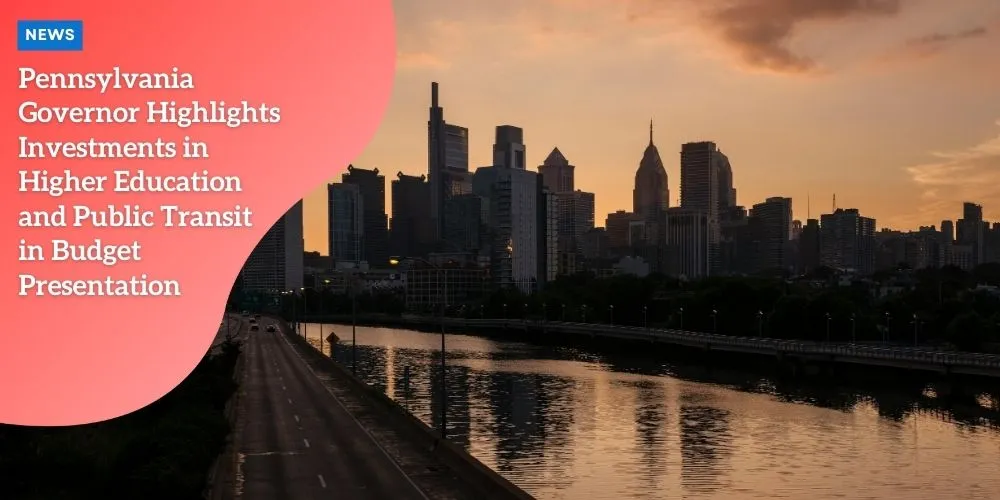Pennsylvania Governor Highlights Investments in Higher Education and Public Transit in Budget Presentation

Introduction
Pennsylvania’s fiscal future is under the spotlight as Governor Josh Shapiro prepares to unveil his budget proposal—a crucial document that outlines the state’s priorities and financial strategies.
Anúncios
Beyond mere numbers, this plan reflects the values and tactics intended to propel Pennsylvania toward prosperity.
The budget will provide a detailed roadmap for how the state plans to allocate its resources, tackle challenges, and support essential sectors that directly impact the lives of its citizens.
Let’s explore the key elements of this vital blueprint that are poised to shape the Commonwealth’s trajectory.
Anúncios
Governor Shapiro’s proposal will touch on everything from education to infrastructure, addressing immediate needs while positioning the state for long-term success.
As we look closer at the details of the proposal, it becomes evident that the budget is not just about balancing the books—it’s about shaping the future of Pennsylvania.
A Brief Overview of Gov. Shapiro’s Upcoming Budget Proposal
At the core of Governor Shapiro’s forthcoming budget proposal lies a resolute commitment to foster the growth and welfare of the Commonwealth.
Anúncios
This financial blueprint is set to fortify the state’s economic landscape while addressing critical needs within its educational and transportation systems.
As stakeholders await guidance on resource allocation, anticipation surrounding this announcement is palpable across various sectors.
The proposal will reflect the Governor’s vision for a sustainable future, where the state’s fiscal health is maintained while addressing the pressing concerns of its people.
In a time when many states face economic challenges, the budget proposal is expected to outline bold steps forward that will benefit not only the current generation but future ones as well.
Governor Shapiro has emphasized that this budget will not just address immediate concerns but will also lay the groundwork for future generations to thrive.
Key Priorities Highlighted in the Budget Address
In the limelight of the Governor’s budget address are priorities resonating with the aspirations of Pennsylvanians.
Higher education funding is slated for a significant boost, acknowledging the pivotal role of a well-educated workforce in economic success.
By directing funds toward colleges and universities, the proposal aims to enhance access to quality higher education, empowering citizens to excel in a competitive job market.
Education is one of the most important investments a state can make, and Shapiro’s focus on bolstering higher education reflects his commitment to ensuring that all Pennsylvanians have the tools they need to succeed.
Moreover, this focus on higher education will help to bridge gaps in the workforce, particularly in fields where there is a growing demand for skilled professionals.
Additionally, public transit receives heightened support, signaling a shift toward sustainable urban living and reduced environmental impact.
With many transit agencies grappling with operational challenges, the proposed focus on public transit could pave the way for improved services, facilitating smoother and eco-friendlier daily commutes.
As urban areas expand and the demand for reliable public transportation grows, it’s crucial that the state adapts by investing in modern, efficient, and environmentally responsible systems.
Public transit is a key component of any sustainable city, reducing traffic congestion and lowering pollution levels, thus contributing to the overall quality of life in Pennsylvania’s urban centers.
Lastly, underfunded public schools are not overlooked.
Additional resources may be channeled to institutions most in need, aiming to foster educational equity and improve student outcomes, thus laying a stronger foundation for future leaders.
This focus on underfunded schools is essential in ensuring that all children, regardless of their socio-economic background, have access to a quality education.
When public schools are properly funded, students are better equipped to succeed academically and professionally, contributing to a more prosperous society as a whole.
Prioritizing Funding for Higher Education
Investing in higher education is paramount for economic development and workforce readiness.
Increased funding can enhance accessibility, affordability, and quality within Pennsylvania’s higher education system.
This investment fuels innovation, equips citizens with job-relevant skills, and attracts businesses seeking a knowledgeable workforce, thereby securing the state’s future prosperity.
]Higher education institutions are critical to the development of a state’s workforce, as they provide individuals with the necessary knowledge and skills to succeed in a competitive job market.
By improving access to higher education, more individuals will have the opportunity to pursue their dreams, leading to a more robust and diverse workforce.
The proposed budget enhancements offer potential benefits across various areas within higher education, including research, infrastructure, and student support services.
Additional funds can stimulate groundbreaking research, modernize facilities, and provide holistic student support, preparing them for success beyond graduation.
Research-driven institutions will have the opportunity to tackle some of society’s most pressing challenges, from healthcare innovations to climate change solutions.
By supporting these institutions, the state can continue to lead in important areas of research and development, attracting even more top talent from across the country.
Impact on Accessibility and Affordability
Increased funding can break down financial barriers, ensuring that higher education is accessible and affordable for students from diverse backgrounds.
More scholarships and reduced tuition costs can level the playing field, making quality education a norm for all.
This expansion of financial support will allow students who may have been previously excluded from pursuing higher education to take advantage of the opportunities it offers.
For many families, the cost of higher education is one of the biggest obstacles to college attendance, and by addressing this challenge, the state can help ensure that all Pennsylvanians have the chance to succeed.
Enhancing Quality of Education
Additional funding can attract top-tier faculty, modernize technology, and offer comprehensive programs, setting a standard of excellence that prepares graduates for competitive job markets.
Quality education not only benefits individual students but also enhances the overall reputation of the state’s higher education institutions.
When universities and colleges are well-funded, they can provide cutting-edge resources and world-class teaching that equip students for the challenges of the modern workforce.
Benefits to Specific Areas within Higher Education
Research: More funding means more opportunities for innovative research, driving technological advancements.
Infrastructure: Upgraded facilities create conducive learning environments aligned with 21st-century demands.
Student Support Services: Enhanced funding provides vital support systems for student success.
All of these areas contribute to making higher education more effective, efficient, and accessible for the students who rely on it to build better futures.
Enhancing Support for Public Transit Agencies
Public transit is pivotal for sustainable urban development and environmental preservation.
By supporting transit agencies, Governor Shapiro’s budget could accelerate Pennsylvania toward a greener future, enhancing accessibility to jobs, education, and healthcare.
Investing in transportation infrastructure will help reduce congestion on the roads, improve air quality, and create more sustainable, livable communities.
As cities continue to grow, effective public transit systems will become even more essential in meeting the transportation needs of residents and reducing their environmental impact.
The Role of Public Transit in Sustainable Development
Public transit reduces carbon footprints and pollutants, contributing to sustainable urban environments.
Investing in transit infrastructure aligns with eco-friendly urban planning, promoting a shift away from car dependency.
Transit systems are vital in ensuring that people have access to employment opportunities, essential services, and social activities without relying on private vehicles.
By making these systems more efficient and accessible, Pennsylvania can work towards a future where transportation is cleaner and more sustainable for everyone.
Tackling Challenges with Increased Funding
Many transit agencies face hurdles like aging infrastructure and limited service areas.
Increased funding could lead to improved systems, expanded routes, and modernized fare collection methods, fostering a more connected and efficient Pennsylvania.
By modernizing these systems, the state can ensure that more people have access to reliable and affordable transportation options, especially in underserved areas.
Success Stories in Public Transit
Upgraded Infrastructure: Improved tracks and vehicles ensure smoother rides and timelier arrivals.
Expanded Services: New routes connect isolated communities to urban centers.
Accessibility Enhancements: Transit stations equipped with ramps and elevators facilitate easy travel for everyone.
These improvements will directly benefit the people who rely on public transportation, making their daily commutes easier, faster, and more efficient.
Addressing Underfunded Public Schools
Underfunded public schools perpetuate educational disparities, affecting teaching quality and student opportunities.
Additional resources can level the playing field, ensuring that all students have access to quality education.
When schools are properly funded, teachers are better supported, resources are more plentiful, and students are given the tools they need to succeed.
The Ripple Effect of Educational Equity
Underfunded schools widen educational gaps, hindering student performance and long-term outcomes.
Addressing these inequities promotes societal mobility and economic growth.
When all students have the opportunity to receive a high-quality education, the entire state benefits from a more educated and skilled workforce.
Strategies for Resource Allocation
Targeted interventions and infrastructure improvements can support underfunded schools, fostering a conducive learning environment and attracting quality teachers.
Investing in these schools is an investment in the state’s future, ensuring that all students—regardless of their background—have access to the education they deserve.
The Broader Societal Impact
Investing in schools boosts economic health, social mobility, and community development.
Well-funded schools produce skilled workers, stimulate economies, and promote equity.
The impact of education extends far beyond the classroom, influencing every facet of society and contributing to a more vibrant and thriving economy.
Conclusion
Governor Shapiro’s budget proposal lays the groundwork for a prosperous and equitable Pennsylvania.
Engaging in the budget process and advocating for priorities that resonate with you is crucial for shaping the state’s future.
Stay informed, engage with local representatives, and advocate for initiatives that promote growth and equity across Pennsylvania.
Together, we can build a brighter future for all residents of the Commonwealth.





